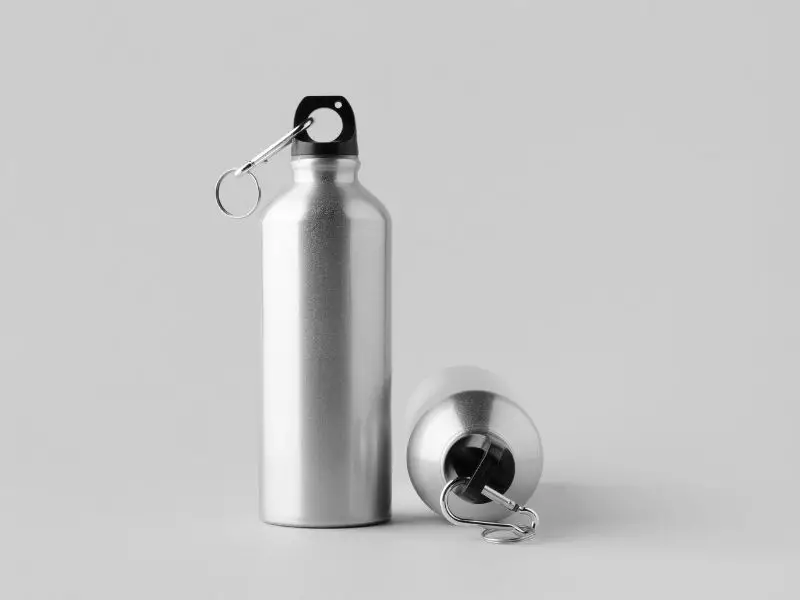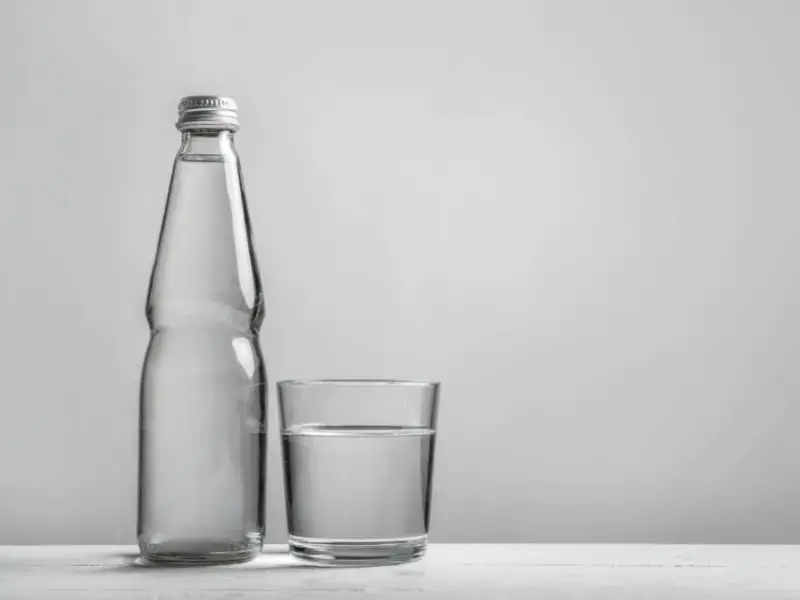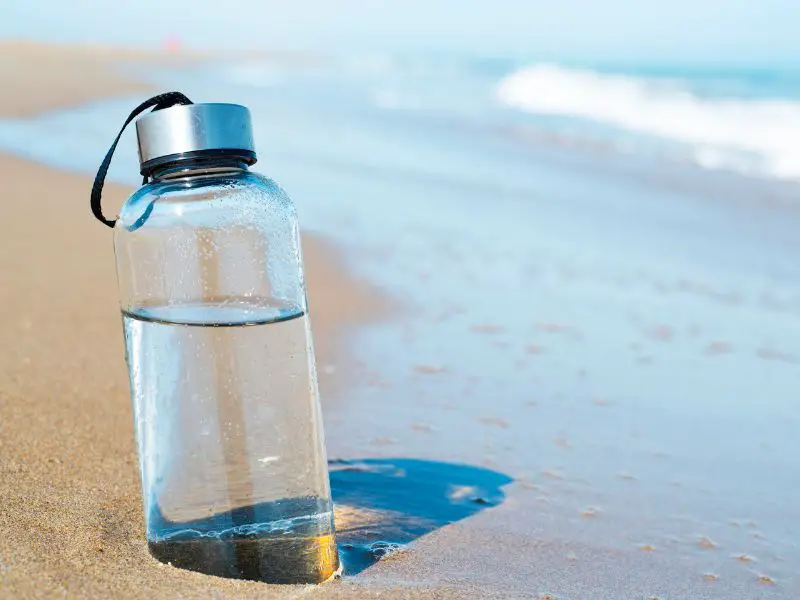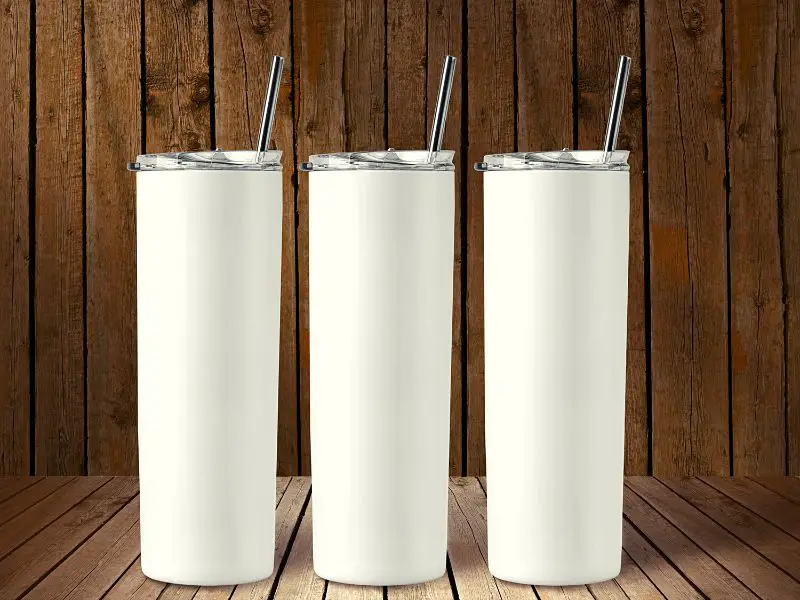According to the EPA, single-use plastic water bottles are one of the most common waste items in the US. In 2015 alone, Americans used 39 billion disposable water bottles, most of which ended up in landfills or waterways. While recycling programs can remedy some of this waste, the amount of plastic water bottles used annually far exceeds the recycling capacity of the country.
Learn how to protect our environment by finding the best plastic water bottle alternatives we can use in our daily lives.
Types of Plastic Bottles
Most water bottle packaging displays a number within a triangle to indicate the type of plastic used. This figure can also be used to measure the safety of reuse.
Here are the two most prevalent plastics used in water bottles.
1. Polyethylene Terephthalate (PETE or PET)
If your bottle has the number “1”, it contains polyethylene terephthalate. This light plastic is ideal for water bottles and containers such as sauce bottles, nut butter containers, and another food packaging.
2. High-density Polyethylene (HDPE)
If your bottle has the number “2” in it, it likely contains high-density polyethylene, also known as HDPE. HDPE is a heavier plastic type than PET and less prone to leaching chemicals into liquids. It’s ideal for detergent bottles, soap bottles, and gallon liquid containers.
Plastic Containers and Bacterial Growth
Plastic bottles can hold bacteria that can make you sick, so most manufacturers say you should only use them once. In reality, bacteria growing in water bottles is a much bigger problem than chemicals leaching into the water.
“Small actions, like using a reusable bottle, can have a big impact on the environment.”
– Unknown
Regular mouth-to-bottle contact can facilitate rapid bacterial growth. Even unfinished beverages left at room temperature can produce astonishing bacterial growth. Due to the rapid spread of germs, it is best to reuse plastic water bottles sparingly and wash them properly.
In addition, reusing a bottle can cause surface cracks and abrasions where germs might thrive. In light of this, you may wish to avoid plastic bottles and purchase a reusable bottle instead.
Top 6 Water Bottle Alternatives
Plastic water bottles damage the environment because of high emissions and improper disposal, so it is best to switch to alternatives. Plastic water bottle alternatives are much healthier and environmentally friendly, as plastic water bottles release chemicals into the environment and harm human health.
“The Earth does not belong to us: we belong to the Earth.”
– Marlee Matlin
There are many plastic water bottle alternatives that can protect the environment and human health. You can recycle plastic bottles, but buying a reusable water bottle is the most sustainable and non-harmful alternative. Reusable water bottles come in varied shapes and sizes and can be easily washed and refilled. They are also remarkable for travel, as they can be carried in backpacks or purses.
Below are some of your options:
1. Aluminum Bottles
Aluminum bottles are excellent water bottle alternatives. They are lightweight, durable, and can also withstand extreme temperatures. Aluminum bottles are a lot more affordable when compared to plastic water bottles but can just as easily be recycled or reused. You can also easily customize aluminum bottles to fit your needs.
In addition, aluminum-bottled water does not contain a plastic lining, unlike soda cans, which require a plastic lining to prevent corrosion. You get water in its purest state, with no leach chemicals.

2. Glass Bottles
Glass is 100% recyclable and can be recycled without limit making them one of the best water bottle alternatives. On the other hand, plastic water bottles are non-renewable and nonrecyclable. Not only is glass reusable, but glass water bottles are also better for your health because they are free of Bisphenol A (BPA) and phthalates, potentially harmful chemicals in plastic water bottles. However, take caution because they shatter with impact and in drastic temperature changes.

3. Reusable Bottles
Reusable water bottles are an excellent option to carry around water. They are much more environmentally friendly than using single-use water bottles. Reusable water bottles are cheaper over time and better for your health than bottled water. Plus, they’re easier on the environment than disposable plastic bottles.
Reusable water bottles come in different materials, including glass, metal, and plastic. Some types, like glass, are better for colder water, while others, like metal, are better for hot beverages.

“Every plastic bottle has a reusable alternative waiting to be chosen.”
– Unknown
4. Boxed Water Bottles
Boxed water provides the same convenience as bottled water but uses an easily recyclable cardboard box. This is much more environmentally friendly than plastic bottled water, as cardboard boxes are more accessible to recycle than plastic or glass bottles. Boxed water packaging has a plastic spout that must be detached from the packing before recycling.
5. Plant-based Plastics
Both biodegradable and edible, plant-based plastics solve two of the biggest problems with regular plastics. No harmful chemicals will enter your drinking water, and the bottles you throw away will break down quickly and safely. The main issue with plant-based plastics is their cost. Currently, they are more expensive to produce than regular plastics like polyethylene terephthalate (PET) or high-density polyethylene (HDPE), so they may take a while to become widely available. Despite this, plant-based plastics could one day replace single-use plastics.
6. Stainless Steel
In the past, stainless steel bottles impart a metallic flavor to the beverages they held, but today stainless steel bottles are coated to prevent this. Stainless steel is also a great conductor, allowing these bottles to keep water substantially colder for longer than bottles made of other materials. Stainless bottles are great water bottle alternatives to avoid the use of plastics.

“Invest in a reusable bottle today, save the planet tomorrow.”
– Unknown
Recommended Water Bottle Alternatives
1. Hydro Flask
Hydro Flask manufactures over 100 products divided into four categories: hydration, coffee, beer, and food.
Its stainless steel vacuum-insulated bottles are available in regular and wide-mouth sizes and a variety of snazzy colors. They’re coated especially to keep beverages hot or cold and avoid condensation. They’re powder-coated for a secure grip and come with a lifetime warranty. Bonus, the cap has handles, making the bottles convenient to transport.
In addition, Hydro Flask is running a charitable giving fund, Parks for All, to support developing and maintaining public green spaces in the United States.
2. Kleen Kanteen
Klean Kanteen boasts its new Climate Lock technology that can keep beverages cold for about 100 hours and hot for up to 30 hours. Bottle sizes vary from 8-ounce tumblers to 64-ounce growlers. All are made of insulated stainless steel.
Many of the bottles have a chip-resistant, robust, and colorful coating. Drinking spouts are produced from silicone that is safe for consumption. The company supports several non-profit organizations committed to eradicating plastic pollution, fighting for safe consumer products, and conserving and preserving natural places.
3. S’well
S’well water bottles are a stylish alternative to plastic water bottles, helping to protect the environment, and look good! Made from food-grade stainless steel, these bottles are vacuum insulated to keep drinks cold even when it’s hot. They come in various colors and models to suit all tastes and are slim enough to fit into your bag without taking up too much space. The lids are spill-proof to ensure nothing is wasted! All products are BPA-free, and the lining is non-toxic, so you won’t have to worry about any nasty chemicals leaking into your drink.
4. Life Factory
If you’re searching for a quality glass bottle, consider Lifefactory. The bottles contain a medical-grade silicone sleeve that makes them simple to grip and a wide opening that can fit ice, fruit slices, tea bags, or anything else you may want to add to your water. The silicone sleeve makes the glass more shatterproof than ordinary glass while still maintaining the ability to withstand extreme temperatures. Best of all, the glass is dishwasher safe. As a bonus, the bottles are made from 100% recycled glass, and the packaging is recyclable too!
Why Are Alternatives to Plastic Bottles Needed More Than Ever?
Plastic water bottles are convenient and widely available but can harm the environment. Single-use plastic water bottles are non-biodegradable, meaning they take hundreds of years to break down in a landfill.
Not only does this harm the ecosystems, but plastic water bottles are also responsible for vast amounts of waste worldwide. Plastic bottles are also a driving factor behind global plastic pollution, harming wildlife and the environment.
While glass and ceramic are more prone to shattering than plastic, they both feature designs that safeguard the bottle. They are cost-effective, available in many designs, and superior to disposable plastic bottles any day. Stainless steel is also a fantastic option if you want something more durable.
And remember, the next time you reach for a plastic water bottle, think carefully about the consequences of your actions. We hope you had fun and learned something from this article. Till next time!
Frequently Asked Questions (FAQs)
Discover how to live an eco-friendly lifestyle with these guides:


3 thoughts on “Plastic Water Bottle Alternatives: Top 6 Best Options to help our Environment”